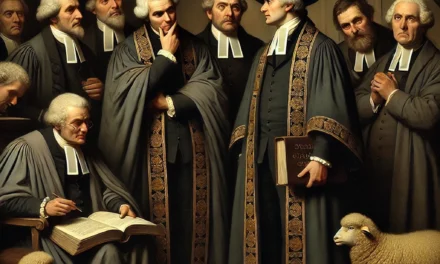Article 1: The Fundamental Issue: The Holy Ghost and the Text of Scripture
Thesis: The Spirit of Truth bears witness to the true text of Scripture, and providential preservation ensures that the Church has received the Word of God without error. Modern textual criticism, by rejecting the traditional text, implicitly claims the Holy Ghost has borne false witness.
Introduction
The present age is marked by a proliferation of theories, methodologies, and proposals concerning the text of the New Testament. These ideas come predominantly from the realm of modern textual criticism, which claims to reconstruct what is termed “the earliest attainable text.” Yet, behind the façade of scholarly neutrality lies a profound theological crisis. Modern textual criticism, grounded in Enlightenment rationalism, assaults the historic Christian doctrine of providential preservation and dethrones the Holy Ghost, effectively accusing Him of misguiding the Church for over eighteen centuries.
The ramifications of this controversy strike at the very heart of biblical authority. The Authorized Version (AV) stands as a faithful English witness to the Textus Receptus, the traditionally received text of the New Testament. This text, which undergirded the Reformation and is enshrined in the confessions of the Reformed tradition, is now scorned by many who favor the eclectic Critical Text. By claiming the traditional text is riddled with errors, modern textual critics imply that the Holy Ghost, whom the Lord Jesus Christ named the “Spirit of truth” (John 16:13, AV), has permitted the vast majority of believers in history to embrace false readings. They charge the Divine Witness with lying about the content of Holy Scripture.
It is not sufficient to regard this debate as a mere academic exercise. This dispute touches upon the character of God, the nature of divine revelation, and the lifeblood of Christian faith and practice. If the Holy Ghost can mislead the Church in the realm of textual transmission, then the entire foundation of Christian epistemology collapses, leaving believers to wonder whether any doctrine has been reliably preserved. In this article, we will demonstrate the vital importance of affirming providential preservation, highlight the superiority of revelational epistemology, expose the corrosive influence of Enlightenment rationalism in textual criticism, examine a key textual variant in Matthew 1:7–10, and draw out the grave theological implications of accusing the Holy Ghost of bearing false witness.
I. The Doctrine of Providential Preservation
Providential preservation holds that God, in His sovereignty, has preserved every word of Scripture throughout the ages so that His people can confidently identify the genuine text of the Old and New Testaments. This conviction is not a recent innovation; it is the clear teaching of Scripture and a pillar of historic Protestant confessions. Psalm 12:6–7 states, “The words of the LORD are pure words…Thou shalt keep them, O LORD, thou shalt preserve them from this generation for ever.” Likewise, Matthew 24:35 declares, “Heaven and earth shall pass away, but my words shall not pass away.” These texts, and many others, testify to God’s unwavering commitment to preserve His Word.
The Westminster Confession of Faith (WCF 1.8) teaches that the Scriptures were “by His singular care and providence kept pure in all ages.” The London Baptist Confession of Faith (LBCF 1.8) echoes the same truth. These confessions leave no room for speculation: the triune God has not only inspired His Word (2 Timothy 3:16) but has also guarded it through centuries of tumult, persecution, and copying, ensuring the Church would have a stable, reliable, and authentic text.
Modern textual criticism, in its naturalistic quest, denies this promise in practice. Proponents of the Critical Text insist that the New Testament text was adulterated over time, thus requiring ongoing scholarly reconstruction. By implication, the Church did not truly possess a pure text until the advent of modern textual methodologies in the nineteenth and twentieth centuries. This is a wholesale rejection of confessional orthodoxy. To posit that the text lay corrupted in the hands of believers for nearly two millennia is to impugn the very nature of God, who declared, “My counsel shall stand, and I will do all my pleasure” (Isaiah 46:10). God’s counsel includes His Word, and He has not left it to the whims and accidents of history.
The Church’s Historical Conviction
Throughout church history, believers have consistently trusted that God preserved His Word in the manuscript tradition they received. Early Christians, medieval theologians, and the Protestant Reformers all manifested confidence that the text available in their day was the genuine Word of God. Such faith was not grounded in collating fragmentary manuscripts or applying the canons of modern textual analysis. Rather, it was rooted in divine promises and in the Holy Ghost’s witness in the Church. Revelation 22:18–19 warns against adding or taking away from the words of God, indicating that these words were known, accessible, and settled long before the dawn of so-called “critical scholarship.”
II. Revelational Epistemology: The Foundation for Certainty
Biblical Christianity rests upon the premise that God reveals truth infallibly, and His people receive it by faith. The believer does not place confidence in Scripture because of majority manuscript consensus or the pronouncements of textual critics. Rather, Scripture is self-authenticating. The Holy Ghost testifies to its truthfulness internally, and the Church, as the pillar and ground of the truth (1 Timothy 3:15), recognizes the voice of her Shepherd in the pages of Holy Writ. Our Lord declared, “My sheep hear my voice, and I know them, and they follow me” (John 10:27).
The Witness of the Holy Ghost
The Holy Ghost functions as the divine interpreter and witness to Scripture. First John 5:6 boldly declares, “And it is the Spirit that beareth witness, because the Spirit is truth.” The very identity of the Spirit is truth, ensuring that He could never sanction widespread deception regarding the text of God’s Word. If it were conceivable that the Holy Ghost allowed an erroneous text to be the primary text for centuries, then either the Holy Ghost would be guilty of negligence, or He would be powerless to fulfill the promises of Christ (John 16:13). Both options are impossible for the all-powerful, all-wise, and perfectly holy God.
Contrast with Academic Rationalism
Modern textual critics dismiss revelational epistemology, elevating human reason to the position of supreme arbiter. They analyze manuscripts using criteria that reflect Enlightenment skepticism: older readings are assumed to be better, shorter readings are presumed to be original, and scribes are viewed with suspicion as potential corrupters of the text. This approach systematically excludes the supernatural oversight of the Holy Ghost, treating the New Testament as nothing more than a historical artifact subject to the same corruption as any pagan text.
This method flips the biblical model of epistemology on its head. Instead of God being the determiner of truth, man seizes that role for himself. No matter how sincere textual critics may be, their entire discipline is built on an unbiblical foundation that denies the fundamental distinction between God’s Word and human literature. The crisis is thus not merely about variant readings but about the principle of authority. Who decides what is correct: God testifying through His preserved Church text, or a guild of scholars applying mutable criteria?
III. Enlightenment Rationalism and the Overthrow of Divine Authority
The Enlightenment era (seventeenth to eighteenth centuries) enthroned human reason, and from this intellectual revolution arose the methodology of modern textual criticism. Scholars cast aside the Church’s theological framework and turned the Bible into a mere subject of historical inquiry. Gone was the reverent submission to God’s promises and the confessional heritage of the Reformation. Instead, textual critics insisted on a supposed neutrality, ignoring the fact that every approach to Scripture is inherently theological.
The Myth of Neutrality
Proponents of modern textual criticism posture themselves as objective scientists, claiming to weigh manuscripts, scribal habits, and internal probabilities with dispassionate accuracy. Yet this claim is a myth. Every critic brings presuppositions to the text: assumptions about the supernatural, the reliability of scribes, and the nature of divine revelation. By treating the text as if it were not superintended by the Holy Ghost, textual critics tacitly adopt naturalism. Psalm 119:160 declares, “Thy word is true from the beginning,” but under Enlightenment rationalism, that very word is treated as a suspect document requiring constant revision.
The Inevitable Theological Consequences
When man’s reason reigns supreme, the Church inevitably doubts the reliability of Scripture. If our only path to recovering the original text is the labyrinth of eclectic textual theories, then we have no sure foundation. Biblical authority crumbles into a shifting sand of conjecture and debate, subject to the next discovery of an earlier manuscript fragment or the next ingenious emendation. This posture collides head-on with the scriptural injunction that believers must live “by every word that proceedeth out of the mouth of God” (Matthew 4:4). If the words are not certain, how can faith be certain?
IV. The Test Case of Matthew 1:7–10
A salient example of the crisis caused by modern textual criticism is found in the genealogy recorded in Matthew 1:7–10. The traditional text, reflected in the Authorized Version, traces the royal lineage of Christ through the recognized kings of Judah. Yet the Critical Text introduces alterations that cast doubt on these names, sometimes substituting or omitting them in ways that create confusion. This editorial revision implies that for centuries, the Church embraced inaccuracies in the very genealogy of the Savior.
The Authorized Version Reading
In the AV, Matthew 1:7–8 reads:
“And Solomon begat Roboam; and Roboam begat Abia; and Abia begat Asa; and Asa begat Josaphat; and Josaphat begat Joram; and Joram begat Ozias…”
These verses present a seamless, recognized lineage, consistent with Old Testament records. It is straightforward, theologically significant, and historically anchored in the Davidic dynasty. Moreover, the text underscores Christ’s rightful claim to David’s throne.
The Critical Text’s Divergence
Modern critical editions may list names such as “Asaph” instead of “Asa,” or introduce variant spellings and omissions that disrupt the genealogical chain. These changes come from a handful of manuscripts that critics deem superior on purely external grounds (e.g., age or perceived scribal habits). The effect is to portray the text used by millions of Christians—including the Reformers and the translators of the AV—as factually deficient. In other words, believers reading Matthew’s Gospel for nearly two millennia supposedly labored under the illusion that the Holy Ghost-inspired genealogical record was correct, when in fact it was erroneous.
If this assessment were true, the Holy Ghost Himself would be implicated in sanctioning a false text. After all, Scripture attests that “holy men of God spake as they were moved by the Holy Ghost” (2 Peter 1:21). If, in time, the Church lost track of what the Holy Ghost originally gave, then the Spirit’s promise to guide believers into all truth (John 16:13) rings hollow.
V. The Implications of Accusing the Holy Ghost of False Witness
Modern textual criticism’s rejection of the Textus Receptus entails a direct indictment of the Spirit’s work in preserving Scripture. Although contemporary critics might claim they have no intention to accuse God of deceit, their methodology declares that the historically received text is unreliable. This implicates the Holy Ghost in deception because He is the divine custodian of truth.
Undermining God’s Faithfulness
God’s faithfulness extends to every aspect of creation and providence, including the transmission of His Word. To suggest that genuine readings vanished from Christian usage until recent centuries contradicts Psalm 119:89: “For ever, O LORD, thy word is settled in heaven.” Since Scripture is settled in heaven, the notion that it became unsettled on earth for generations denies God’s ability or willingness to execute His will.Questioning the Authority of Scripture
If the text that fueled the Reformation and formed the basis of great doctrinal formulations is inaccurate, Christians must ask which of their doctrines rest upon faulty premises. The entire structure of confessional Christianity—so boldly proclaimed by men like Luther, Calvin, and Owen—hangs on the authenticity of the text. Modern textual criticism’s challenge to the text inevitably subverts the Church’s confidence in every doctrine gleaned from that text.Eroding the Church’s Testimony
Christ promised that the “gates of hell shall not prevail” against His Church (Matthew 16:18). If the Church collectively affirmed a spurious text for most of its history, the gates of hell would have scored a monumental victory. The Church’s witness to the truth of Scripture would be compromised, and the Bride of Christ would appear to have been led astray in the very foundation of her authority—the Word of God.Assaulting the Person and Work of the Holy Ghost
The Holy Ghost is not merely a passive bystander in the drama of redemption; He is the active Spirit of Truth, whose role includes testifying of Christ (John 15:26) and imparting assurance to believers that Scripture is indeed God’s Word. The Spirit’s testimony includes the text’s reception within the Church over the centuries. Declaring that the Spirit approved or failed to correct widespread textual corruption is tantamount to claiming the Spirit either deceived believers or was incompetent. Both scenarios are impossible for a holy, omnipotent God.
The assault on the Holy Ghost’s veracity demands that believers either question God’s character or resist the claims of modern textual criticism. The two positions cannot be reconciled. Faithful Christians must refuse to adopt any theory that impugns the Spirit’s faithfulness to preserve the text which He breathed out (2 Timothy 3:16).
VI. A Deliberate Denial of Biblical Promises
Beyond the immediate questions of textual variants, modern textual criticism stands as a denial of specific biblical promises concerning the preservation of God’s Word. In Isaiah 40:8, the prophet proclaims, “The grass withereth, the flower fadeth: but the word of our God shall stand for ever.” The plain reading of this verse assures believers that despite the fleeting nature of creation, the Word endures. The Lord Jesus Himself reaffirmed that “till heaven and earth pass, one jot or one tittle shall in no wise pass from the law” (Matthew 5:18). These promises cannot be harmonized with a method that insists God’s people have been bereft of the true text until modern times.
How Scholars Undermine These Promises
Textual critics sometimes concede that Scripture as a general message might have been preserved, while they maintain that details such as genealogies, doxologies, or smaller phrases might have been lost. This half-hearted concession seeks to maintain the illusion of orthodoxy while contravening the consistent biblical emphasis on the precise preservation of every word. The Lord Jesus said man lives “by every word that proceedeth out of the mouth of God” (Matthew 4:4). Even seemingly minor textual distinctions may bear significant doctrinal weight, since “all Scripture is given by inspiration of God” (2 Timothy 3:16).
VII. Conclusion
Modern textual criticism’s approach to Matthew 1:7–10—and to the New Testament as a whole—fundamentally challenges the doctrine that the Holy Ghost has faithfully borne witness to the true text of Scripture throughout church history. This is not a mere quibble over genealogical details; it is an assault on the very character of God. The Holy Ghost has been labeled, either directly or by implication, an unfaithful custodian of truth or a silent observer to the corruption of God’s own Word. Such a charge has no place in a biblical, confessional, and God-fearing view of Scripture.
The Confessional doctrines of providential preservation (WCF 1.8, LBCF 1.8) and the clear witness of the Authorized Version to the historic received text stand as bulwarks against the Enlightenment’s naturalistic intrusion. Those who deny these doctrines entangle themselves in self-contradiction and theological chaos, for they must either concede that God lied about preserving His Word or maintain that the Church worshiped for centuries in ignorance of what He actually said. Neither alternative is tolerable for any who believe in the power and holiness of God.
The heart of the matter is inescapably theological and spiritual. It asks: Who reigns supreme—God or man? If God reigns, then He has preserved His Word, and the Spirit has guided the Church to receive the text with confidence. If man reigns, then the text is an open question, subject to the shifting trends of scholarly opinion. The stakes are immense, for if the text is uncertain, then every doctrine is cast into doubt. The question of the Holy Ghost’s integrity stands at the forefront: can the Spirit of Truth deceive the Church? Faithful believers will answer with a resounding “No.”
Modern textual criticism is not merely an innocent academic endeavor; it is a direct challenge to the biblical and confessional doctrines that undergird the Christian faith. It introduces skepticism about the Spirit’s witness, dismisses God’s promises of preservation, and enthrones fallen human reason. The genealogical variant in Matthew 1:7–10 serves as a stark reminder of the crisis: if the Holy Ghost did not preserve even something as fundamental as the Lord’s royal ancestry in the vast majority of manuscripts embraced by the Church, then every other promise of God’s reliability is suspect.
Therefore, believers must stand unapologetically on the side of the Holy Ghost, affirming He has never failed in His role as the divine Protector of Scripture. They must uphold the Textus Receptus, the text historically recognized by the faithful, translated in the Authorized Version, and confirmed through the Spirit’s testimony in His people. Rejecting modern textual criticism is not an option but a necessity for those who refuse to accuse the Spirit of deception. God has spoken in His Word, and He has not lied nor let His words slip away. The Church, standing on the sure foundation of divine revelation, must hold fast to the conviction that “for ever, O LORD, thy word is settled in heaven” (Psalm 119:89), and that this settled Word is indeed the possession of the saints on earth.




